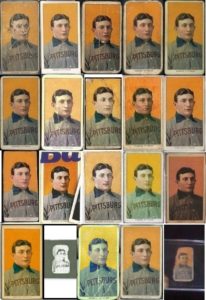“Can I have your autograph?” That’s a deceptively simple question. Firstly, what is an autograph? It’s a person’s signature on something. Most people sign their names everyday in many different ways, without thinking much about it. As a practicing dentist, I’ve written my signature more times than I care to remember on insurance forms, lab instructions, prescriptions, doctor’s notes, etc. I’ve never had a patient or staff member insist on keeping that piece of paper for the value of my signature.
Then again, I’m not famous, so no one seeks my written signature for its inherent value. If I ever become famous, I will definitely join those who refuse to sign autographs. Oscar Wilde (below) once wrote, “The artist shouldn’t try to become more public, the public needs to become more artistic.” That is correct, so consider what that means and how it applies to autographs.
Autographs and other sports memorabilia collecting can be linked in origin to the baseball card industry, which revved up in the 1980’s and took off in the 1990’s. Before then, baseball cards (like autographs) were a mostly a childhood delight. Kids collect and trade stuff naturally, with sports heroes & other celebrities being among their favorites. Baseball cards have been around as long as baseball itself.
In 1952, Topps decided to sell baseball cards in packs, which led to a massive growth in their popularity. By the 1980’s, a number of new companies began producing baseball cards including Fleer, Donruss and Upper Deck and the market expanded considerably. Since 2000, there has been massive increase in speculation in this industry, attributable to an influx of new collectors with high disposable income. Much of this is comparable to what’s going on in the art world, with forgeries and dirty dealing being the norm.
Today, most signature seekers are actually professional autograph traders, who make their living by selling them, rather than keeping them as personal souvenirs. Celebrities aren’t stupid, and many have found their own ways to deal with this problem:
Basketball star Bill Russell (above), and actors Paul Newman & Greta Garbo all declined autograph requests in their days.
Actor Will Ferrell (above) mocks and taunts fans when they request his autograph. Makes you think twice before asking.
Talk show host Rosie O’Donnell (above) has refused to sign autographs for years, calling adult autograph seekers “sad.” She’s correct.
Constantly overrun with requests, actor/comedian Steve Martin (above) years ago had business cards with his autograph pre-printed, or cards that read, “This certifies that you have had a personal encounter with me and that you found me warm, polite, intelligent and funny.” Very creative.
Ex-Beatle Paul McCartney (above) announced in 2010 that he would no longer sign autographs while out, and said that “most people are very understanding because they understand privacy.” Most do.
Here’s his former band mate, Ringo Starr two years earlier:
Professional golfer Jordan Spieth has recently commented on signing autographs. “We like to sign stuff for charity or for kids — and if you ask anybody universally it’s the same way, it’s just, they (professional autograph hustlers) frustrate us.”
Danica Patrick was recently videoed at Pocono after practice, trying to explain herself to a few merciless autograph hounds, who have no interest in anything except getting the goods for themselves:
Bottom Line: No one (not even a handicapped kid) should ever expect an autograph from anyone. An autograph is a gift that a celebrity chooses to donate. Do you go up to other people (you don’t know personally) and ask them for a gift, and actually expect to receive it? Do you interrupt people while they are working, expect them to do you a favor, and berate them if they don’t comply? That’s completely selfish. Athletes are competitors, which means they are wound tightly and they don’t take this kind of crap. When celebrities are provoked by seekers, you will get any of these above reactions, which are all justifiable.
Memorabilia is about making money, not the integrity of their product. And just what is their product, anyways? A signature. A card. A ball or jersey. It produces nothing in value, and is the very definition of a speculative bubble. Dealers, auction houses and industry “experts” talk openly about finding novice buyers, which are required to perpetuate this sham industry. As long as people invest into this, it will continue.
Third-party authentication (TPA) services grade cards and other memorabilia, for a fee. Like any other business, the idea is to make money, and they do that by pleasing their customers. This means authenticating known forgeries from ‘good’ customers. Autographs are commonly sold with certificates of authenticity (COA’s) and letters of authenticity (LOA’s), while trading cards use a grading system. COA’s, LOA’s, and grades are meant to assure the buyer that the signature or item is genuine.
The problem is the entire sports memorabilia and trading card industry is run by a few people with bad reputations and/or criminal records. Third-Party Authentication giants PSA/DNA and JSA have cornered the market as the official “experts” endorsed by the major sports and collectibles auction houses, and even the online auction giant eBay.
PSA/DNA’s lead authenticator, Steve Grad, has a spot on the History Channel’s hit show Pawn Stars as their ‘on-air expert’ for autographed materials. The TPA’s are advertised as the gold standard of an autograph industry fraught with fraud, deception and forgery. The FBI has claimed that over 50% of the signed collectibles in the marketplace are counterfeits [1].
Often the services that do the authentication are also the ones that own the property and are selling it, creating an obvious conflict-of-interest. Shills are routinely used in the auctions to make the prices go up. There is an entirely unregulated industry, full of hustlers & con men.
Industry pioneer Bill Mastro (above) formulated the TPA grading system to help protect himself and his fellow auctioneers. TPA’s have also shielded themselves from any liability by stating that their LOA’s are nothing more than an opinion and guarantee absolutely nothing. Mastro has acknowledged that he trimmed the world’s most valuable baseball card, the T206 Honus Wagner (below) once owned by NHL superstar Wayne Gretzky, greatly inflating its value.
Authors Michael O’Keefe and Teri Thompson present a strong case that the card was actually cut from a sheet of cards, trimmed and altered. It seems that too many people have too much to lose, if this was actually proven, so the facts are conveniently ignored. No owner will allow “The Card” to be removed from its protective case to be re-authenticated, as that would risk losing all it’s value. On October 1, 2016, “The Card” sold for $3.12M in a private auction.
For those not familiar with this story, Honus Wagner was the great shortstop for the Pittsburgh Pirates at the turn of the 20th century. The legend is Wagner objected to his likeness being used to promote tobacco use to children (baseball cards came in cigarette packs back then) and demanded the American Tobacco Company pull the card from the market. The other claim (from researchers) is that Wagner, who chewed tobacco himself and did advertisements for cigars, was actually just holding out for more money. Whatever the reason, only between 75 and 200 Wagner T206’s ever made it to the public, as compared to the “tens or hundreds of thousands” of T206 cards, over three years (1909-11) in sixteen brands of cigarettes, for any other player. There are only ~65 known Wagner T206’s left, and most are in poor condition. Here are a few examples:
The point is, whenever someone brings a ‘newly discovered’ Wagner T206 to the market, it is greeted with both excitement & skepticism. Most of the time they are proven as forgeries. The facts point towards the world’s most valuable baseball card most-likely also being a fake, and that doesn’t bode well for this industry in the long-term. The truth is, this sports memorabilia craze is like all the rest under American capitalism, in which lawlessness & unethical behavior dominate, in order to make money from nothing.
Final point of etiquette: Parents need to teach their kids that when they ask for a celebrity’s autograph, they are making a bargain for life. The celebrity is choosing to give a piece of him/herself to the fan. If it eventually gets sold, then the celebrity isn’t making a fan, but instead feeding the machine. When this happens over & over, celebrities get jaded. All celebrities monitor this nowadays.
The overall message on everything discussed above, is that the current set-up isn’t working for celebrities or the fans. It’s only benefiting a thin layer of parasites who are ruining things for everybody else. Most athletes will tell you that they enjoy signing autographs for charity, and especially for the kids. They do it for that look of surprise & joy that only comes from innocent eyes, and makes a fan for life. The problem of problems is that everything under capitalism has to make money, and it’s the bleeping money that ruins everything.
…………<><><><><><><><>…………













